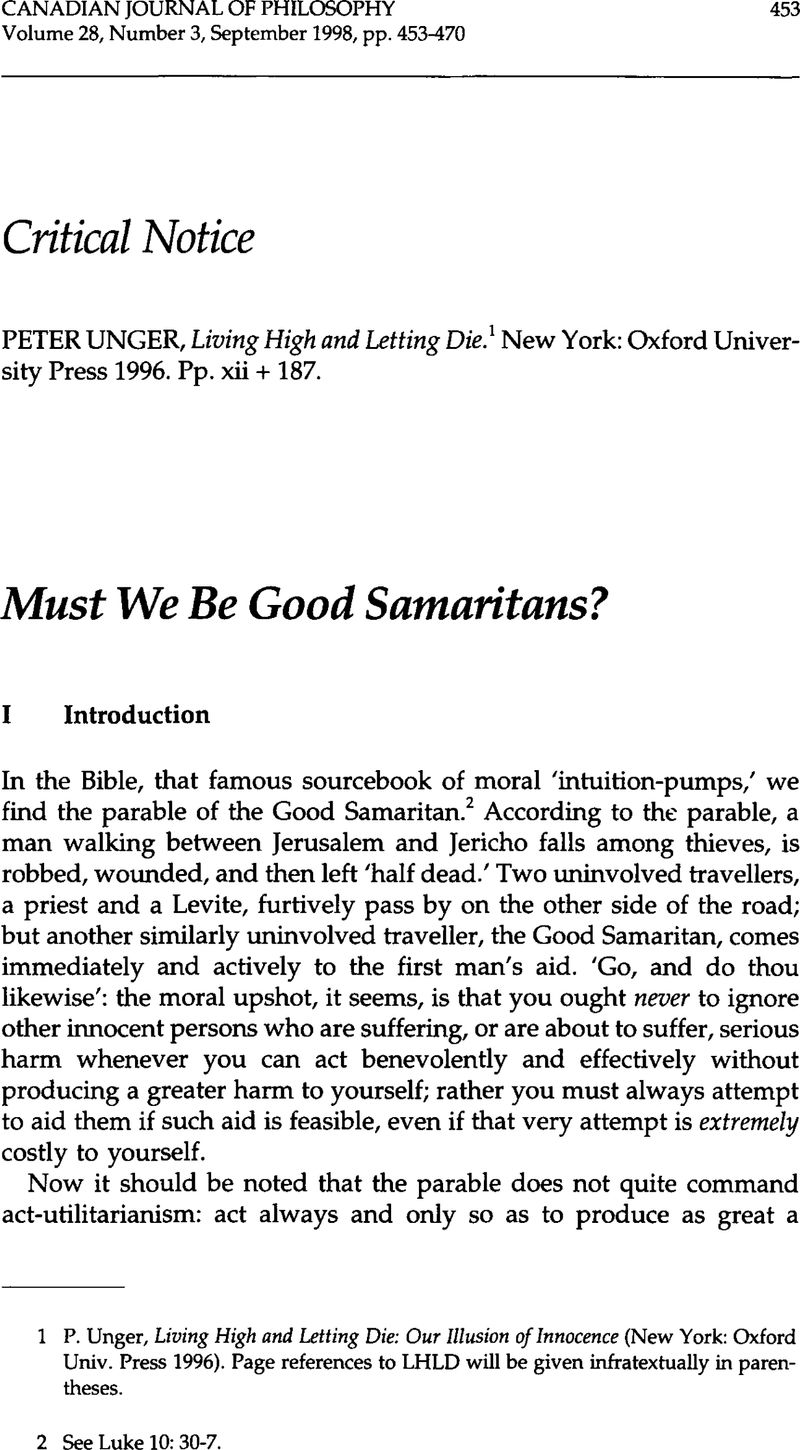Published online by Cambridge University Press: 01 January 2020

1 Unger, P. Living High and Letting Die: Our Illusion of Innocence (New York: Oxford Univ. Press 1996)CrossRefGoogle Scholar. Page references to LHLD will be given infratextually in parentheses.
2 See Luke 10: 30-7.
3 In holding this thesis, Unger follows in the footsteps of Singer's, Peter famous philosophical appeal for third world philanthropy, ‘Famine, Affluence, and Morality,’ Philosophy and Public Affairs 1 (1972), 229–43Google Scholar.
4 This, I think, explains the otherwise odd fact that some early reviews of LHLD have been unusually testy; see, e.g., McGinn, Colin ‘Saint Elsewhere,’ The New Republic (October 14, 1996), 54–7Google Scholar.
5 See Rawls, John ‘Outline of a Decision Procedure for Ethics,’ Philosophical Review 60 (1951), 177–97.CrossRefGoogle Scholar
6 It should also be frankly admitted that Unger's examples are often amusing in a gruesome, Monty Pythonesque way. Unfortunately this too is apt to annoy the enemies of MMI, although quite irrelevantly.
7 Other recent arguments for Liberationism can be found in Singer's, Peter Practical Ethics (Cambridge: Cambridge Univ. Press 1979/1993)Google Scholar, and Kagan's, Shelly The Limits of Morality (Oxford: Oxford Univ. Press 1989)Google Scholar.
8 See Lewis, David ‘Scorekeeping in a Language Game,’ in Philosophical Papers (New York: Oxford Univ. Press 1983), 233–49.Google Scholar
9 Lewis, D. ‘Illusory Innocence?,’ in Eureka Street 6 (1997), 36Google Scholar
10 Separational vagueness is particularly evident in several of the crucial cases Unger considers in chapters 4 and 5, all of which are variants on the familiar ‘Trolley Problem’ examples. I discuss the application of the insider I outsider distinction to the Trolley Problem in ‘Morality De Re: Reflections on the Trolley Problem,’ in Fischer, J.M. and Ravizza, M. eds., Ethical Problems and Principles (New York: Harcourt, Brace, Jovanovich 1992), 318–36Google Scholar, and the problem of separational vagueness in ‘Participants and Bystanders,’ Journal of Social Philosophy 24 (Winter 1993), 161-9.
The Trolley Problem was originally sketched in Foot's, Philippa essay, ‘The Problem of Abortion and the Doctrine of the Double Effect,’ reprinted in Virtues and Vices and Other Essays in Moral Philosophy (Berkeley, CA: Univ. of California Press 1978), 19-32.Google Scholar See also parts I and VII of Fischer and Ravizza, eds., Ethics: Problems and Principles, for the follow-up literature.
11 See Wolf, Susan ‘Moral Saints,’ Journal of Philosophy 79 (1982), 419–39CrossRefGoogle Scholar. Wolf nicely brings out the ambivalences in our attitudes towards utilitarian and Kantian saints alike.
12 See note 10.
13 I argue for this thesis in ‘Morality De Re: Reflections on the Trolley Problem.’
14 There may be special exceptions to this in cases in which the drowning child is your child; here, it seems, the C-Type person is usually as strenuously obligated as the A-Type or B-Type agent.
15 My advocacy of C-Type Good Samaritanhood is, I think, quite similar to Kant's well-known (but not, perhaps, well understood) idea in the Grounding for the Metaphysics of Morals that benevolence is an ‘imperfect duty.’ My refinement or extension of Kant's idea is simply that it is separation which necessarily constrains our obligation to be benevolent, and thereby generates its ‘imperfect’ character.
16 I would like to thank Jeff McMahan and an anonymous referee at CJP for very helpful critical comments on an earlier version of this essay, and also Martha Hanna and Elizabeth Hanna for their equally helpful ready supply of moral intuitions.